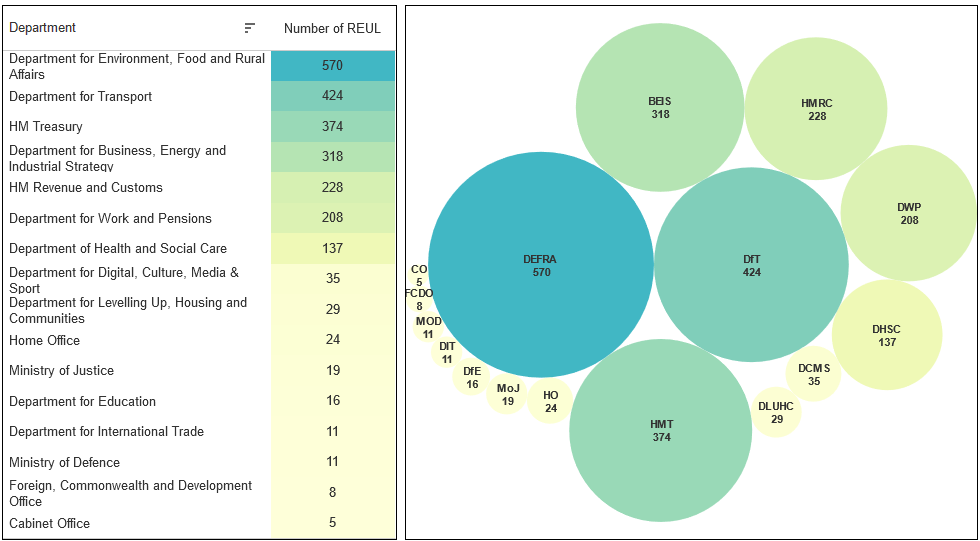Brexit & Beyond Newsletter
28 November 2022

Welcome to the 28 November 2022 Brexit & Beyond newsletter
The Lords Sub-Committee on the Protocol has written to the Foreign Secretary, setting out the evidence and arguments heard in its inquiry into the Northern Ireland Protocol Bill. The Senedd has voted on the Bill and did not give consent. The better regulation watchdog has published its report on the Retained EU Law (Revocation and Reform) Bill, finding the Government’s impact assessment “not fit for purpose”. Further written evidence on the Bill has been published as it passes through the Commons. The Lords European Affairs Committee has heard how the Protocol dispute is impacting energy cooperation between the EU and UK.
Northern Ireland Protocol Bill inquiry
The House of Lords Sub-Committee on the Protocol on Ireland/Northern Ireland has written to the Foreign Secretary on the Northern Ireland Protocol Bill. The letter summarises the findings of the Committee’s inquiry into the Bill, taking account of evidence sessions during the committee’s visit to Newry and Belfast. The Committee requests information on a range of issues from the Government, including its analysis of the economic impact of the Bill. Regarding the Government’s proposed dual regulatory regime, it notes concern from businesses “about the lack of detail around how it will work in practice, and, for some, over its impact on North-South trade and trade with the EU.” The Committee emphasises that “it is crucial that both the UK and the EU enhance their engagement with stakeholders in Northern Ireland, including business, civic society and political representatives, to assure them that the issues in relation to the Protocol are being resolved with their full co-operation and involvement, rather than being imposed upon them.”

Lord Jay, Chair of the Protocol on Ireland/Northern Ireland Sub-Committee | Source: UK Parliament
The Committee notes that cross-border businesses were generally more critical of the Bill. For example, Michael Hanley, CEO of Lakeland Dairies, said that if unchanged, the Bill “will have an immediate negative impact on our business, as well as the whole of the Northern Ireland dairy sector”, which largely operates on an all-island basis. Others pointed to economic problems with the way that the Protocol is currently operating. The road haulage sector relies heavily on East-West trade. Peter Summerton, Managing Director of McCulla Ireland, said that he sees a Northern Ireland Protocol that “is not working”, a consequence of “the application of the rules of international trade, SPS and customs to a fast-moving consumer goods trail between Great Britain and Northern Ireland.”
Legislative consent
On 22 November, the Senedd voted on a legislative consent motion on the Northern Ireland Protocol Bill. The motion was not agreed (35 votes for, 15 against) i.e. the Senedd did not consent to the UK Parliament considering the provisions of the Bill which fall within the legislative competence of the Senedd. Mick Antoniw (Welsh Counsel General and Minister for the Constitution) said the Bill “may well, in all probability, breach international law.” He remarked that many of the regulation-making powers in the Bill are “so broad that they lack any real clarity of purpose, and this has significant potential implications for Wales and for our devolution settlement”. Finally, he said, “We were given no role in the drafting of this Bill…we disagree with the UK Government's tactical approach.”
Retained EU Law Bill
Detailed scrutiny of the Retained EU Law Bill continued in the Commons last week, ahead of the final day of committee stage tomorrow, 29 November. The Regulatory Policy Committee, an independent body, sponsored by the Department for Business, Energy and Industrial Strategy to help produce better regulation, has reported on the Bill. It finds the Government’s impact assessment for the Bill “not fit for purpose as it failed to consider adequately the full impacts of the Bill.” Regarding devolved administrations, the report states that the impact assessment should explain “the expected approach to REUL across the devolved administrations as well as the implications of any regulatory divergence for businesses and the extra resources required.” The Government’s impact assessment states that likely around 1,000 statutory instruments (SIs) will be required between Royal Assent and the sunset date, which would be a larger programme of work than EU Exit transitional SIs (around 800 SIs) and “will take up a significant amount of parliamentary time”.
The Institute of Directors, along with representatives of trade unions, employers, lawyers, environmental groups and civic society, have written to the Secretary of State for Business, Energy and Industrial Strategy calling on him to withdraw the Retained EU Law Bill. They say, “There is a huge risk of poor or potentially detrimental law entering the statute book.”

Government statistics of Retained EU Law by department | Source: UK Government Retained EU Law dashboard
Written evidence
A wide range of groups and individuals have submitted written evidence to the Public Bill Committee, which is scrutinising the Bill at committee stage. Several organisations have raised concerns about the potential impact on employment rights. An amendment was debated last week to exclude certain regulations on workers’ protections from the sunset provisions in the Bill.
Meta, owner of Facebook and Instagram, has written to the committee, asking for the Electronic Commerce (EC Directive) Regulations 2002, which ensures online platforms are not principally liable for unlawful content, to be “explicitly maintained elsewhere or…removed from scope of the Revocation Bill.” Make UK, which represents 20,000 manufacturers, says 348 laws on the UK Government’s dashboard of Retained EU Law directly affect the manufacturing sector. It calls for clarity over which individual pieces of legislation will be changed or replaced and says the sunset deadline is “too ambitious”. Viviane Gravey, Senior Lecturer in European Politics Queen’s University Belfast and co-chair of Brexit & Environment, writes that “the problems of accountability (both to Parliament and stakeholders), legal certainty and civil service capacity which clearly exist in England cut through even more deeply in the devolved administrations (which sees REUL Bill as huge workload imposed by London) and especially in Northern Ireland where the issues are both more complex (interaction with Protocol, with Protocol Bill) and more difficult to address (no sitting Assembly or functioning Executive).” Mick Antoniw, Welsh Counsel General and Minister for the Constitution writes, “It would be intolerable for the UK Government to seek to sunset legislation made by the Senedd.”
Northern Ireland Retained EU Law
Departments in NI have been undertaking work to identify the devolved legislation in the scope of the Retained EU Law Bill (REUL Bill). In response to a written question in October, while Ministers were still in place in NI, the Minister of Agriculture, Environment and Rural Affairs stated, “Estimates are that there are over 600 separate pieces of legislation within the Department’s responsibility that could be affected by the Bill.” The Department for Infrastructure estimates that approximately 500 pieces of REUL could be affected and says officials are “ engaging with colleagues in the Executive Office, legal advisers and officials in Whitehall to understand the full implications of this Bill and its potential impact on my Department.” The Minister for Health has listed the 19 pieces of legislation affected by the REUL Bill, which are under the responsibility of the Department of Health, as well as 46 regulations under the responsibility of the Food Standards Agency in Northern Ireland.
The Government has stated that the Department for Business, Energy and Industrial Strategy (which oversees the REUL Bill) has confirmed that “all commitments required for the operation of the Protocol contained in retained EU law will be retained, along with those for other international obligations.”
NI Protocol and EU-UK energy cooperation
On Tuesday 22 November the Lords European Affairs Committee took evidence on EU-UK relations regarding energy, the environment and climate change. The EU’s Carbon Border Adjustment Mechanism (CBAM) was discussed. CBAM would impose a carbon emissions levy on goods imported to the EU, similar to that paid by domestic producers under the EU’s Emissions Trading System (ETS) price. Mark Copley, CEO of the European Federation of Energy Traders, explained that Northern Ireland has two carbon prices: a small number of the electricity generators in Northern Ireland are in the EU ETS, while the rest of the industry is in the UK ETS. He said a CBAM could work “extremely badly” for transmitting electricity from GB to NI, as the arrangements could create complexity and an additional impediment to trade. Deputy Director of Energy UK, Adam Berman, explained that CBAM falls within the scope of the Northern Ireland Protocol and said it “would constitute a significant regulatory barrier for companies in Northern Ireland wishing to trade with the Republic of Ireland.” He added, “We could get into complex negotiations about removing that, but in the end, the EU would come back to the same thing they use for Ireland all the time, which is that it constitutes a backdoor into the single market if the CBAM is not applied.” He said a UK CBAM will not solve any of these regulatory issues and suggested the only realistic way for the UK to ensure that the CBAM does not apply to it is to link emissions trading systems: “You end up with linkage being the only way out of the very tricky political impasse in Northern Ireland…[it] makes a great deal of sense.”

Deputy Director of Energy UK, Adam Berman | Source: UK Parliament
On the negative impact of the Protocol dispute on wider EU-UK relations, witnesses explained some areas where cooperation is stalled, such as new working arrangements between the UK’s electricity and gas systems operators and the corresponding EU associations (ESO and GSO, and the ENTSO-E and ENTSOG respectively), and progress on electricity trading arrangements. Berman said, “it is entirely clear that the EU is unwilling to move forward substantively…until there is some resolution on the question of the Protocol”. He said this has been “a little frustrating, given that we are both in the midst of an energy crisis, we share a common physical energy infrastructure and, if ever there was a moment to work more closely together outside the confines of some of the nuts and bolts of the [Trade and Cooperation Agreement], it is now.”
Other news
- The Government has introduced the Northern Ireland (Executive Formation etc) Bill. It would extend the deadline for the Executive to form, before another election would be called. It would also clarify the decision-making powers for civil servants in the absence of Ministers. All stages of the Bill are scheduled tomorrow, 29 November.
- European Commission President Ursula von der Leyen will address the Oireachtas on Thursday 1 December.
- The Government has announced a package of up to £484million for the research and development sector, “in response to the EU’s refusal to finalise the UK’s association to Horizon Europe and other related EU science programmes as agreed under the Trade and Cooperation Agreement (TCA) in 2020.” The Business Secretary Grant Shapps said, “The UK cannot wait indefinitely for the EU to meet its commitments.”



